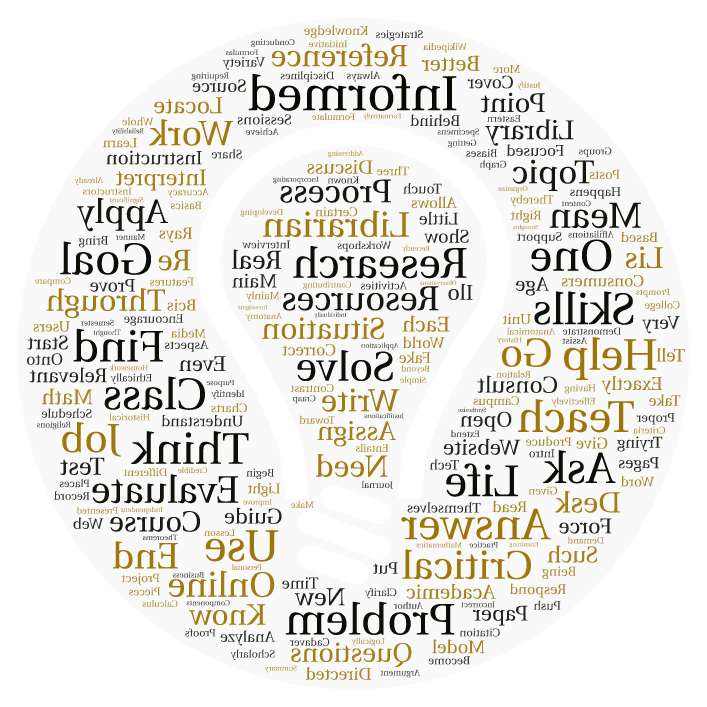国际劳工组织-批判性思考
批判性思考——调查结果

How do you help students improve their critical thinking skills?
批判性的思考
- Locate relevant information resources and use them effectively and ethically (discussed by 70% of responses)
- Interpret, analyze, synthesize, and 评估 ideas and information (discussed by 92% of responses)
- 将知识和技能应用于各种情况 (discussed by 100% of responses)
反应
| 组件 | 受访者选择 |
| Locate relevant information resources and use them effectively and ethically | 61% |
| Interpret, analyze, synthesize, and 评估 ideas and information | 89% |
| 将知识和技能应用于各种情况 | 8 3% |
图书馆
作为一名学术图书管理员, my main job is to teach students critical thinking skills and that happens through a variety of means. The reference desk allows me to work one on one with students on their research assignments from disciplines across campus. 我也教讲习班和图书馆教学课程, 安排与学生的研究咨询, 支持在线课程. 我也教LIS 11:研究策略. 在我的课程中, 学生们被要求为维基百科页面进行研究, 从而为世界贡献学术信息. There is very little about being a librarian that does not touch critical thinking aspects. (Tia Germar)
Reference librarians help students at any point in the research process, 通过适当的引用来发展一个主题. 主要是, a reference librarian helps students "locate relevant information resources and then use them effectively and ethically." We start this by conducting a reference interview which helps to clarify what exactly a student needs and why. We then discuss with the student why we have directed them to certain resources and how they can use them for their information need. Students might have questions about how to 评估 different resources, 如何解释他们找到的信息, or how they might go about incorporating information into a paper or project. Librarians can guide a student through all of these activities. Our goal is always that the skills we teach may be used in other classes and life situations so that students will become better consumers and users of information. (瑞秋Arteaga)
在学校当图书管理员, my job entails teaching students how to find informational resources, 评估它们的相关性和准确性, 并在他们的研究和写作中使用它们. I (and other librarians) do this one-on-one at the reference desk, and in groups when instructors bring their classes in for library instruction. I also write research guides for students to consult at any time, 关于诸如理解历史来源之类的话题, 评估假新闻时代的媒体, 等等....... The library is exactly where students can go to learn about all three of these components of the critical thinking ILO! (让·平)
By encouraging students to be independent and take the initiative to find the answers for themselves, while also pointing them in the right direction toward the resources that can help them achieve their goals.(路加福音Sarcona)
Math
造型的, by asking open ended questions in class and having them share answers with each other, 然后对全班同学做出回应, 彼此之间. On homework and tests, students are not only asked for the answer, but for justifications. Students are also asked to apply knowledge to application problems (word problems) showing they can think logically (and critically) through a situation. (丽塔真空吸滤)
解释和应用他们的数学答案到现实生活中. (Scott Giannini)
I encourage students to use their resources and what they already know about a situation or problem, 在处理新情况或新问题时.
解释和应用他们的数学答案到现实生活中.
I ask open-ended questions which force students to think about a recently covered topic. They have to process what information was given and what they are trying to show or prove.
让他们解决问题/展示解决问题的能力
We work on math problems, they think about the problems and apply them to real life situations.
微积分对批判性思维有很大的要求. I ask students to understand pieces of the proofs behind some of the formulas and theorems. I have students work on problems in class and help students individually. (里克·丹纳)
I ask them questions about the lesson that extend beyond the basics, 比如“你怎么知道你的答案是正确的??、“你想证明什么??你的图表告诉你什么?、“你的回答与……有什么关系?...?"
In mathematics, most students are focused on getting correct answers. 然而, I push the students in writing their thought process behind the answers even if it means the answer is incorrect. I teach them how to organize so that they can improve in a more simple manner into the problem solving skills rather than focusing on how to even begin. (Sanjay Dev)
医学杂志农业气象学
我问的问题需要他们思考, 评估, 比较与对比, 分析和解释信息. I assign problem-based research papers that forces them to research information to formulate an argument to solve a problem presented to them. In Anatomy we have students apply knowledge of anatomical features on models and charts onto cadaver specimens and x-rays. (Jill Terra)
社会与行为ioral科学
在我的东方宗教在线课上, students re-read their discussion posts in light of my class summary, 然后响应日志提示. The goal is for students at the end of the semester to know their own thinking processes better and to identify biases that they might not have known they have. (丹巴内特)
B独联体
在我的B独联体 18商业技术入门课程中, I teach a web evaluation unit using the CRAAP test as a model for evaluation criteria. The goal is to make students informed consumers of online information. We cover how to locate information about a website and investigate its history, 作者, 目的, 可靠性, 和从属关系. Students then put these skills into practice examining and evaluating online content. 他们分析网站, 记录他们的观察结果, synthesize their findings to justify why they would/would not find a website a credible source for academic or personal research.
FYE
帮助他们自己做. 帮助学生找到自己的长处. (约翰溶胶化)